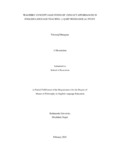
Please use this identifier to cite or link to this item:
https://hdl.handle.net/20.500.14301/482| Title: | Teachers' Conceptualizations of Using ICT Affordances in English Language Teaching: A Q Methodological Study |
| Authors: | Dhungana, Tirtharaj |
| Citation: | Dhungana, T.(2025).Teachers' conceptualizations of using ICT affordances in English language teaching: A Q methodological study. |
| Issue Date: | Feb-2025 |
| Publisher: | Kathmandu University School of Education |
| School: | SOED |
| Department: | DOLE |
| Level: | M.Phil. |
| Program: | Master of Philosophy (MPhil) in English Language Education |
| Abstract: | This study critically examines how secondary-level English language teachers conceptualize and enact Information and Communication Technology (ICT) affordances in rural English Language Teaching (ELT) contexts. It also takes into account factors influencing these teachers’ conceptualizations. Examining the manifold self-referential subjective viewpoints of English teachers regarding ICT affordances usage allows the researcher to uncover the ICT integration realities, including the enablers and barriers inherent in rural ELT contexts. This study adopts an interpretive research design within a social constructionist paradigm and also adapts some theoretical concepts of Gibson’s Affordance Theory and Davis’s Technology Acceptance Model (TAM). It uses Q-sorts and post-sort interviews within Q methodology research to capture a holistic understanding of teachers’ conceptualizations of ICT affordances. Factor analysis of Q-sorts reveals three dominant conceptualizations of ICT affordances: Practical and Accessible ICT, Collaborative and Interactive ICT, and Adaptive and Content-Driven ICT. Further analysis of these three conceptualizations (factors) revealed that teachers enacted a total of twelve ICT affordances in rural ELT contexts, which are, in turn, collectively shaped by infrastructural, technological, and pedagogical factors. The findings of this study inform that English teachers in rural contexts largely recognise the potential of ICT affordance tools that are offline, multimodal, and interactive to facilitate diverse skills and aspects of the English language. However, infrastructural limitations, lack of internet access, and training gaps prevent their full implementation. These aspects demand that the related stakeholders and policymakers target their strategies and actions towards investing in ICT infrastructure, devising context-sensitive policies to mitigate the widened digital divide of rural contexts, and implementing teacher training modules tailored to the needs of rural English teachers. |
| URI: | https://hdl.handle.net/20.500.14301/482 |
| Appears in Collections: | Dissertation |
Files in This Item:
| File | Description | Size | Format | |
|---|---|---|---|---|
| Tirtharaj Dhungana's MPhil ELE Revised_Dissertation.pdf | 4.84 MB | Adobe PDF |  View/Open |
Items in DSpace are protected by copyright, with all rights reserved, unless otherwise indicated.